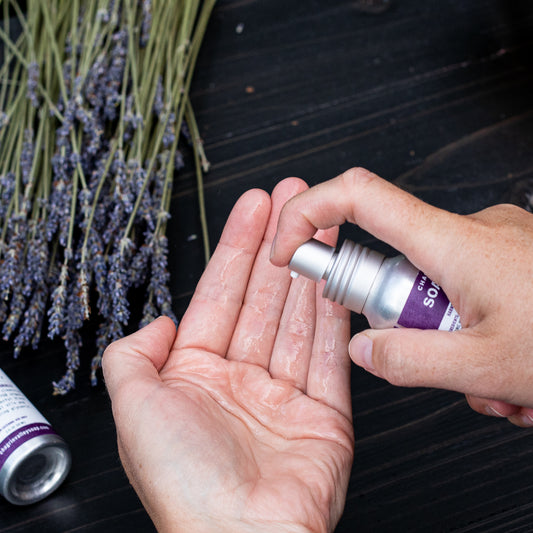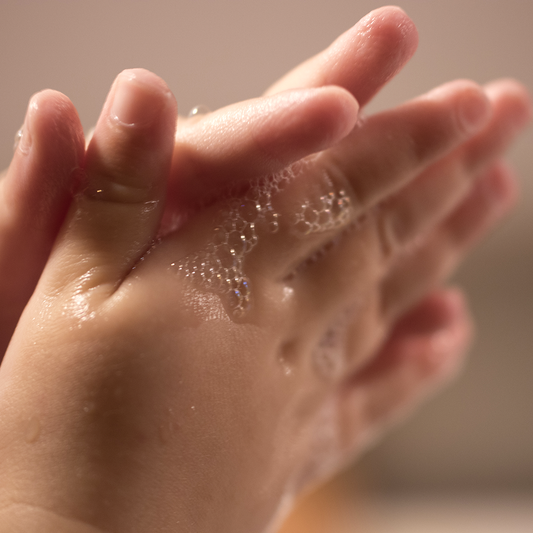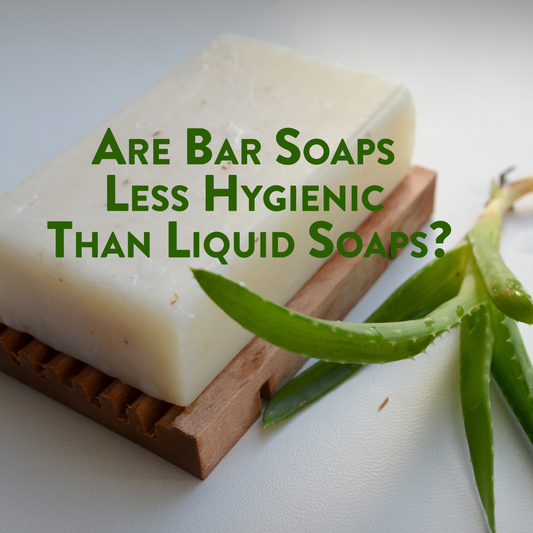Do We Need Antibacterial Soap?
 When you need soap, body wash, or household cleaners, do you reach for products labeled “antibacterial?”
When you need soap, body wash, or household cleaners, do you reach for products labeled “antibacterial?”
I understand why folks (especially those with children) are choosing products labeled “ANTIBACTERIAL,” hoping to keep their family safe in the war against germs.
There are so many commercials and ads that extol the virtues of antibacterial soaps and cleaners. After all, they "kill 99.9% of germs." Sounds terrific, right? Shouldn’t we all want germ-free hands and countertops?
A study done by the FDA (Federal Drug Administration) concluded that “mass-marketed antiseptics have shown no evidence of preventing infections more effectively than hand washing with regular soap.”
"Consumers may think antibacterial washes are more effective at preventing the spread of germs, but we have no scientific evidence that they are any better than plain soap and water,” said Janet Woodcock, M.D., director of the FDA’s Center for Drug Evaluation and Research (CDER). “In fact, some data suggests that antibacterial ingredients may do more harm than good over the long-term. Source fda.gov/news-events
"According to the U.S. Food and Drug Administration (FDA), there isn’t enough science to show that over-the-counter (OTC) antibacterial soaps are better at preventing illness than washing with plain soap and water. To date, the benefits of using antibacterial hand soap haven’t been proven. In addition, the wide use of these products over a long time has raised the question of potential negative effects on your health." Source fda.gov/cosumer-updates
Adding synthetic antibacterial chemicals to soap does not keep your family safe from germs.
FDA Bans Triclosan
In 2013 the FDA issued a proposed rule that required the manufacturers of antibacterial hand soaps and body washes to prove that their products were more effective than plain soap and were safe for long-term use. The proof never came.
So, on September 2, 2106, the FDA issued a final rule banning the use of 19 active ingredients, including triclosan and triclocarban, found in antibacterial hand and body washes.
If a product makes any antibacterial or antiseptic claims, chances are pretty good that it contains one of these 19 ingredients.
Companies have one year, until September 2017, to remove these ingredients from their products or remove the products from the market.
This Ban Is Good News, Right?
 While the FDA's new ban seems to be good news, the ban only applies to hand and body washes – products that are “intended for use with water, and are rinsed off after use.” (Source: fda.gov)
While the FDA's new ban seems to be good news, the ban only applies to hand and body washes – products that are “intended for use with water, and are rinsed off after use.” (Source: fda.gov)
An article published in 2015 in the International Journal of Environmental Research and Public Health by Garry Dhillon et al diagrams the bad news.
There are many other products, including cosmetics, shaving creams, toothpaste, deodorants, lip balm, body lotion, fragrances, household cleaners, sponges, and even facial tissues and mattresses, that can still use antibacterial chemicals under the present ban. Antibacterials are also found in workout clothes and children's toys.
The ban also does not affect antibacterial soaps used in hospitals and food service settings or the hand sanitizers and wipes that have a pervasive presence in our daily lives.
Countless other products still contain triclosan, despite the ban on hand and body washes. The FDA claims that it needs more information before making a final ruling on these other products.
Antibacterials Will Not Go Away Anytime Soon!!
 While the majority of bacteria that we encounter every day are not our enemies, millions of Americans continue to want antibacterial products. As long as consumers want them, the industry will figure out a way to provide them.
While the majority of bacteria that we encounter every day are not our enemies, millions of Americans continue to want antibacterial products. As long as consumers want them, the industry will figure out a way to provide them.
Many companies have already removed the banned ingredients and replaced them with one of three other chemicals called quaternary ammonia compounds; benzalkonium chloride, benzethonium chloride, or chloroxylenol.
While it is easy to find triclosan on an ingredient list, these other ingredients go by so many different names they can easily hide and may be difficult to identify.
Health officials worry that these antibacterial agents, which have not been approved by the FDA, will have the same problems as triclosan and the other banned additives. Manufacturers have been given a year to gather evidence that supports the safety and effectiveness of these new antibacterial additions.
Problems With Antibacterials and Hand Sanitizers. . . They Don't Work Better Than Soap
By the year 2000, triclosan was present in 75% of liquid soap and almost 30% of bar soap in the United States.
However, a study done by the FDA showed that "antibacterial soaps have shown no evidence of preventing infections more effectively than hand washing with regular soap.”
The CDC states that although "alcohol-based hand sanitizers can quickly reduce the number of microbes on hands in some situations, sanitizers do not eliminate all types of germs." Soap and water are actually more effective than hand sanitizers at removing certain kinds of germs.
The CDC further states that "Although alcohol-based hand sanitizers can inactivate many types of microbes very effectively when used correctly, people may not use a large enough volume of the sanitizers or may wipe it off before it has dried." Source cdc.gov
All Bacteria Are Not Germs
 The word "Germ" is not a technical term, but we use it to reference microscopic organisms, like bacteria and viruses, that cause disease.
The word "Germ" is not a technical term, but we use it to reference microscopic organisms, like bacteria and viruses, that cause disease.
The problem is that we often think that all bacteria are disease-causing germs, but nothing could be further from the truth.
Most of the bacteria that live in and on our bodies are not only helpful but are also necessary for our good health. Sadly, the belief that having bacteria on our skin is bad, feeds our obsession with antibacterial products.
We have all heard about the importance of the natural microbiome in our gut that is necessary for good digestive and overall health. Well, the microbiome on our skin is equally as important.
Natural bacteria that live on our skin act as the first line of defense to help fight off bad bacteria. For this defense to work properly, the good bacteria need to stay on our skin. Unfortunately, antibacterial agents do not discriminate between bad and good bacteria, they kill them all.
Researchers believe that one possible cause of the increase in inflammatory skin diseases, like eczema, is an imbalance of normal skin bacteria. (Source: Immune System, Skin Microbiome "Complement" One Another, Finds Penn Medicine Study at uphs.edu)
Viruses Are Not Bacteria
While antibacterial agents do work on bacteria, they do nothing to protect against viruses which cause the majority of minor illnesses like colds and flu.
Furthermore, antibacterial soaps strip away the helpful bacteria that help keep the balance of our microbiome. As a result, fungal and viral infections are able to flourish.
The natural bacteria present on your skin actually compete for space with bad bacteria, fungi, and viruses to keep your microbiome healthy.
I Have To Wash How Long?
What the commercials do not tell you is that in order for an antibacterial soap to kill 99.9% of germs on your hands, the soap must remain in contact with bacteria for about two minutes.
How many of us spend that much time washing our hands? The same is true for kitchen cleaners . . . the cleaner must sit for at least two minutes.
Antibacterial Products Cause Superbugs
 Scientists know that long-term exposure to chemical antibacterial agents causes bacterial resistance. Only a few years after the first antibiotic, penicillin, became widely used in the 1940s, penicillin-resistant infections were already seen.
Scientists know that long-term exposure to chemical antibacterial agents causes bacterial resistance. Only a few years after the first antibiotic, penicillin, became widely used in the 1940s, penicillin-resistant infections were already seen.
“Superbugs,” are stronger than the original bacteria. These resistant bacteria force the development of stronger and stronger antibacterial agents to fight illness.
In an 2021 article entitled "Feeding the superbugs: Why we need to wash our hands of antibacterial soaps," Trevor Lithgow states:
“If I wash my hands constantly with antibacterial or antimicrobial soaps, the microbes that live on my hands will be constantly barraged by antimicrobials, and they’ll become superbugs. So I end up carrying superbugs with me wherever I go."
Professor Lithgow is Director of Australia's Monash Centre to Impact AMR, a group of 200 scientists and researchers working to stop the spread of antimicrobial resistance (AMR), or antibiotic resistance, in superbugs. This is where bacteria become resistant to medicines, and people die. It is predicted that AMR diseases will kill 10 million people a year by 2050.
Ecological Impact of Antibacterial Products
Antibacterial additives found in body and hand soaps, laundry detergents, cleaning products are washed down our drains, where they contaminate our rivers, streams, and groundwater. A 2004 study by the CDC found that “about three-quarters of adults and children older than six had detectable levels of triclosan” in their bloodstreams."
A study in Environmental Health Perspectives found triclosan in 74.6% of people’s urine samples. And triclosan has been found in 97 percent of breast milk samples studied.
Eventually, what we put into our drain water makes its way back to us. Most modern treatment processes cannot fully filter out triclosan. In fact, the wastewater treatment process often breaks down triclosan into more dangerous forms.
The Great Lakes basin receives wastewater from about 40 million surrounding residents. Triclosan has been detected in 90 percent of surface water samples and found in many fish in the Great Lakes.
Adding antibacterials to soaps is good for marketing, but not good for our health or the health of our planet.
Germs and Dirt Help Build The Immune System
When my children were younger and some of their friends would get sick a lot, my mom would always say it was because they did not get their "peck of dirt" today. Although that is not how the quote is really worded, I know what she meant. Children need to get dirty playing outside in nature so they are exposed to a diversity germs which helps build a stronger immune system.
According to Dr. Mary Ruebush,
"For decades, we’ve been a culture obsessed with avoiding germs, convinced that getting dirty is dangerous. But some health professionals insist that exposure to a range of bacteria is not only safe, but it is also essential to human health and immunity.
The immune system is like an athlete: To become strong and adept, it needs training and practice. Hyper-sanitized environments deny it that opportunity and keep it sedentary and out of shape." (Source: experiencelife.com "Dirt, Germs, and Other Friendly Filth")
What Can We Use Instead of Antibacterial Products?
For Personal Use
 A study published in the Journal of Antimicrobial Chemotherapy found that antibacterial soaps provide no benefit over washing your hands with plain soap and water.
A study published in the Journal of Antimicrobial Chemotherapy found that antibacterial soaps provide no benefit over washing your hands with plain soap and water.
So we recommend good hand washing with natural soap and water.
Simply washing your hands with an old-fashioned natural soap and water rids your skin of most fungi, bacteria, and viruses. Soap does not kill germs, it surrounds them and carries them away.
The best way to prevent the spread of the illness is to wash your hands often. The CDC recommends washing your hands with soap and water for a duration of 20 seconds rubbing and lathering the backs of the hands, between your fingers, and under your nails.
In order to effectively time out 20 seconds while washing your hands, you can hum or sing the "Happy Birthday" song twice from beginning to end. Then rinse with plenty of clean warm water.
Although cold water will work, warm water helps dissolve oily dirt making it easier to rinse it off of your skin.
According to Professor Lithgow, "The message is, soaps are good. Keep using them. Keep washing your hands. But antibacterial additives in soap are not good. You don’t need them, so don’t buy the soaps that include them. It’s in your hands.”
Of course, our Chagrin Valley Natural Soaps, made with organic ingredients, are a great choice to naturally clean your hands and body.
Read our blog, Simple Soap Can Help Decrease The Spread of Viruses
 If soap and water are not available the CDC states that using a commercial alcohol-based hand sanitizer for 20 seconds will offer some protection between hand washings.
If soap and water are not available the CDC states that using a commercial alcohol-based hand sanitizer for 20 seconds will offer some protection between hand washings.
- sanitizer should contain at least 60% alcohol
- while alcohol can kill bacteria, it will not clean hands
- not effective against E-coli -- so not good in the kitchen
- be sure to read the ingredients--some alcohol sanitizers still contain antibacterial agents
Update: As of August 2020 we now sell two 75% Organic Ethyl Alcohol Hand Sanitizers made without synthetic antibacterial agents.
Read "Is Hand Sanitizer as Effective as Soap and Water?"
For Household Use
For household use my go-to cleaner is plain, ordinary, vinegar. I use full-strength vinegar to clean countertops and greasy stovetops etc. I use a 1:1 dilution of water and vinegar in a spray bottle as my all-purpose cleaner around the house. (I sometimes add essential oils)
White vinegars, like Heinz, contain at least 5 percent acetic acid and are called "5 percent vinegars." The acidic properties create a low pH which is too strong for most germs to survive, making vinegar a great inexpensive household cleaner.
Vinegar is non-toxic, biodegradable, environmentally friendly, and does not give off dangerous fumes. While vinegar does have a distinct odor, the smell dissipates quickly.
I also like to make essential oil cleaners using oils known for their antibacterial properties, like tea tree, thyme, lavender, oregano, or rosemary. There is a lot of information available on the Internet about making your own natural and effective household cleaners.
One added note, be sure that you are not using a crusty, old, bacteria-laden sponge or dishcloth to clean your home!
The message from Professor Lithgow about using antibacterial liquid and bar soaps is clear:
“You don’t want to be cultivating drug-resistant bacteria. This is not an esoteric issue; it’s about our homes and workplaces and waterways, and this is something people will care about. Part of our job should be that we can help the public to understand more about antimicrobial resistance and superbugs."
I hope you enjoyed our blog. Please share your thoughts with us. Do you have any recipes for homemade natural cleaners?
(updated 2021)


